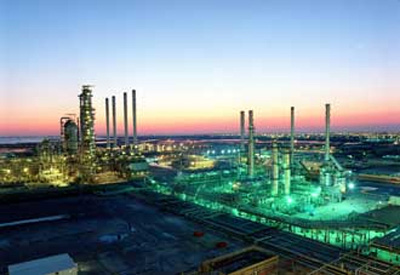Oil Worries, Food Supply Fears for Saudi Arabia
Jun 16th, 08
Although the world's largest oil producing nation has recently pledged to increase their output by an additional 200,000 barrels per day, the New York Times reported on June 14th that some investors are skeptical whether this could be fulfilled.
 Sources close to the Saudi oil industry, unnamed oil analysts and traders believed that a previously reported half million barrels per day (500,000 bpd) would be a benchmark that Saudi Arabia could not meet. The official word from Riyadh to the United Nations was that the kingdom would increase its oil production by 200,000 barrels per day next month. In May, Saudi Arabia had increased its daily production by 300,000 barrels, bringing its daily total output to 9.45 million barrels per day.
Sources close to the Saudi oil industry, unnamed oil analysts and traders believed that a previously reported half million barrels per day (500,000 bpd) would be a benchmark that Saudi Arabia could not meet. The official word from Riyadh to the United Nations was that the kingdom would increase its oil production by 200,000 barrels per day next month. In May, Saudi Arabia had increased its daily production by 300,000 barrels, bringing its daily total output to 9.45 million barrels per day.
However, the country's ability to produce any more than 9.45 million bpd of easily refined light sweet crude is heavily reliant on the newly-discovered Khursaniyah field, which according to a source close to the industry reports is not yet producing to its full capacity.
The Khursaniyah field was expected to start pumping oil in 2007, but only started producing in 2008 because of technical delays. And even then, it was expected to produce 500,000 barrels per day, but is currently producing just 300,000 barrels per day. The plan is that Khursaniyah can raise its production by 200,000 barrels, but that would be the maximum, according to Saudi Aramco's annual report. The Saudi plans were disclosed in interviews with oil traders and analysts who said that Saudi oil officials had privately conveyed their production plans recently to some traders and companies in the United States. The analysts declined to be identified so as not to be cut off from future information from the Saudis.
Saudi Arabia has expressed concerns that continued high oil prices will eventually slacken the world's appetite for oil, which would affect them in the long run. As they are reaping record high profits, the Saudis fear that lower economic activity, alternative fuel developments, and a general decline in demand from major importing nations would hurt the kingdom's long-term prospects.
Additionally, Saudi Arabia has called for an emergency meeting amongst oil producing and consuming nations on June 22nd to discuss methods to deal with the soaring crude prices. Along with the producing Middle East nations, the United States, Russia, Britain, China, India and Japan are expected to attend.
Reuters reports that the June 22nd meeting in the Red Sea town of Jeddah would also include dialog concerning the Arab producers worries about food supplies. Record high oil prices and their impact on the industrialized world will certainly be the hot topics on the agenda, but food security could also feature as arid Middle East nations worry about affordably feeding their rapidly expanding populations.
Poor harvests, low stocks and rising demand have sent food prices to record highs, stoking protests, strikes and violence in Africa, Latin America, Asia and the Middle East. Dwindling water makes the issue more dramatic for the Gulf Arab region. While the pursuit of food security is nothing new to the Middle East - a region that enjoys less rainfall and imports more food than anywhere else on earth - this time around the stakes are higher because of the role of oil.
High oil prices and the fact that they are likely to remain high means that the region is on a sustainable growth path in financial terms, its populations can expand and the level of wealth and overall economic growth can rise further still. 
The high price of oil also means that the pursuit of food self-sustainability will fall from fashion, as the physical limits of the region, particularly in terms of water, make it unwise to grow wheat in the desert. Instead, with foreign currency pouring in and with the likelihood that it will continue for the foreseeable future, food security for the Middle East means new ties to countries that are able to produce food affordably.
The Saudi government this week said it was in talks with Sudan, Egypt, Ukraine, Pakistan and Turkey to allow Saudi companies to establish projects for wheat, barley, soya bean, rice and animal fodder.
Food security no longer equates to self-sufficiency as population growth and the natural limits of the land -- due partially to drought, disease and conflicts -- have in many cases been surpassed.
Security for the Saudis has also long meant ensuring sustainable, steady demand for oil -- soaring oil prices could knock major economies into recession and depress demand.
"Saudi Arabia is interested in moderate oil prices because they have the largest proven oil reserves and they can continue to pump oil for a long time, so it is not in their interest to make the other energy alternatives economically feasible very soon" said Khalid Al-Dakhil, professor at King Saud University.
"They are not interested in high oil prices at all. In the long run it works against their interests."
Certainly for the continuance of the norm, all oil producing and consuming states and citizens will be highly interested in the outcome of the June 22nd meeting.